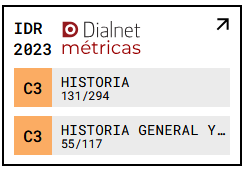Three Uses of the Term “Culture”
Universalist, Romantic and Anthropological
DOI:
https://doi.org/10.18172/brocar.6331Keywords:
Culture, Enlightenment, Herder, Tylor, anthropologyAbstract
This article explores the evolution of the concept of culture from its origins in the second half of the first century BC to the 21st century. The initial meaning, a universalist one, was used from Cicero until the Enlightenment and explained culture as a set of knowledge and wisdom that converted mankind into human beings, allowing individuals to transcend their wild, animal nature; it was the Enlightened tradition which linked culture to progress and civilization. The Romantic view was expounded by Herder, who explained the term as the cultivation of spirit and literary activity; this interpretation challenged the use of the term culture as synonymous with technical, industrial and urban progress, while also discovering and magnifying popular culture. The anthropological vision of culture was proposed by Tylor. He defended the existence of a uniform civilization formed by different cultural situations which were a consequence of the distinct stages of development of each human society therefore showing a uniform humanity while, at the same time, different levels of evolution within this uniformity. These affirmations showed the existence of “inferior tribes” and of “superior nations”. Tylor’s ultimate purpose was to provide an outline or schematic of the evolution of culture and with it demonstrate that its tendency has been to pass from savagery towards civilization. At present, the term culture is overused in a polysemous manner; its polysemy is a result of its all-encompassing application to any human activity connected to symbolic representations of the world or its rational understanding, as well as more local, everyday practices, habits and attitudes. And it is this polysemy that underlies the current overuse of the concept.
Downloads
References
ANDRÉS-GALLEGO, José: “De la cultura animi a la cultura como hábito: De cómo la cultura llegó a ser lo que es hoy”, Rocinante Studi di Filosofía in lengua spagnola, II (2006), pp. 1-16.
CABANILLAS NÚÑEZ, Carlos Manuel (coord.) y CALERO CARRETERO, José Ángel (coords): Actas de las III Jornadas de Humanidades Clásicas. Mérida, Junta de Extremadura, Secretaría General de Educación, 2002.
CICERÓN: Disputaciones Tusculanas. Madrid, Editorial Gredos, 2005.
COPLESTON, Frederick: Historia de la Filosofía. Vol. VI. De Wolf a Kant. Barcelona, Ariel, 2002.
COROMINAS, J. y PASCUAL, J. A.: Diccionario Crítico Etimológico Castellano e Hispánico. Volumen II, Madrid, Gredos, 1984.
DÍEZ ÁLVAREZ, Luis Gonzalo: “Johann G. Herder: perfil intelectual de un ilustrado radical”, Arbor, 193-784 (2017), pp. 1-12. DOI: https://doi.org/10.3989/arbor.2017.784n2007
EAGLETON, Terry: Cultura. Barcelona, Taurus, 2019.
ESQUILO: Prometeo encadenado. Barcelona, Debolsillo, 2009.
FINKIELKRAUT, Alain: La derrota del pensamiento. Barcelona, Anagrama, 1987.
GARCÍA DOMÍNGUEZ, Luis Miguel y GONZÁLEZ CORTÉS, José Ramón: “Breves anotaciones sobre el concepto de cultura en el mundo clásico”, en CABANILLAS NÚÑEZ, Carlos Manuel (coord.) y CALERO CARRETERO, José Ángel (coord.): Actas de las III Jornadas de Humanidades Clásicas. Mérida, Junta de Extremadura, Secretaría General de Educación, 2002, pp. 35-44.
GRACIÁN, Baltasar: Oráculo manual y arte de prudencia. Sentencia 87. Alicante, Biblioteca Virtual Miguel de Cervantes, 1999.
HEINZ, Marion: “Teorías de la cultura de la Ilustración: Herder y Kant”, Ideas y Valores, 109 (1999), pp. 119-133.
HERDER, Johann Gottfried: Antropología e Historia. Madrid, Universidad Complutense de Madrid, 2002.
HESÍODO: Teogonía. Trabajos y días. Escudo. Certamen. Madrid, Alianza, 2013.
KAHN, J. S.: El concepto de cultura: textos fundamentales. Barcelona, Anagrama, 1975.
MARTÍNEZ SAHUQUILLO, Irene: “Los dos conceptos de cultura: entre la oposición y la confusión”. REIS: Revista Española de Investigaciones Sociológicas, 79 (1997), pp. 173-196. DOI: https://doi.org/10.2307/40184012
PLATÓN: Diálogos I. Madrid, Gredos, 2011.
ROUSSEAU, Jean-Jacques: Emilio o De la educación. Madrid, Alianza, 2011.
ROUSSEAU, Jean-Jacques: El Contrato social. Madrid, Akal, 2016.
SAFRANSKI, Rüdiger: Romanticismo. Una odisea del espíritu alemán. Barcelona, Tusquets Editores, 2014.
SAN MARTÍN SALA, Javier: Teoría de la cultura, Madrid, Editorial Síntesis, 1999.
UNESCO: Conferencia Mundial sobre Políticas Culturales http://www.unesco.org/new/es/Mexico/work-areas/culture, [Consultada el 14/12/2021].
Downloads
Published
How to Cite
Issue
Section
License
Copyright (c) 2024 Esteban Moreno Ruiz

This work is licensed under a Creative Commons Attribution 4.0 International License.
The authors retain copyright of articles and authorize CIF the first publication. They are free to share and redistribute the article without obtaining permission from the publisher as long as they give appropriate credit to the editor and the journal.
Self-archiving is allowed too. In fact, it is recommendable to deposit a PDF version of the paper in academic and/or institutional repositories.
It is recommended to include the DOI number.
This journal is licensed under a Creative Commons Attribution 4.0 International License











